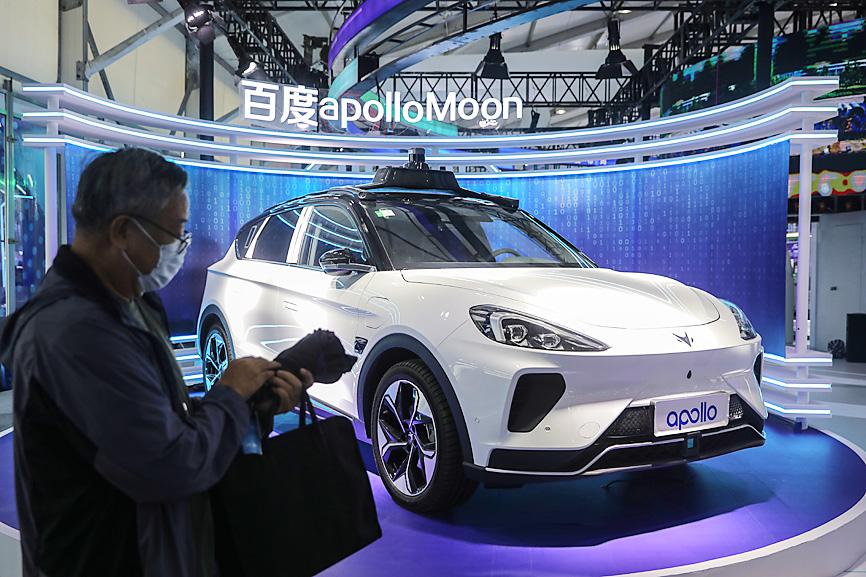Search giant Baidu Inc (百度) and Toyota Motor Corp-backed Pony.ai Inc (小馬智行) were granted the first batch of licenses from Beijing regulators to start open-road autonomous commercial driving operations in a part of the city equivalent to the size of Manhattan.
The pilot licenses will allow a fleet of about 100 cars from the two companies to travel around the 60km2 so-called Beijing High-level Automated Driving Demonstration Area, about a 30-minute drive from Tiananmen Square, state media reports said.
Baidu received 67 of the permits and will allow its robotaxis to range between more than 600 pickup and dropoff points from 7am and 10pm, it said in a statement yesterday.

Photo: EPA-EFE
The area includes commercial and residential precincts.
Pony.ai is to set up about 200 points in the zone, running from 8:30am to 10:30pm, the Guangzhou-based company said.
“Beijing, as the capital city and the first one to allow fare charging for robotaxi rides, will help companies accelerate autonomous vehicle deployment and test out and explore a business model,” BloombergNEF analyst Jinghong Lyu said. “It will also benefit industry players across the country as other local governments may follow Beijing.”
Beijing is one of the first places in the world to embark on such a concentrated trial of robotaxis in a commercial environment. Baidu and Pony.ai will be able to charge consumers for the rides, although detail around pricing and payment methods were not immediately available.
However, totally replacing drivers in China, where labor costs are low and the government has a keen interest in maintaining near full employment, would be tough, and not just from a business sense. The nation’s growing, but relatively inexperienced driving population makes for complex and often unpredictable traffic conditions, while varied road rules and street signs across provinces bring more challenges to the technology application.
“The issuing of the permits signifies that the development of autonomous driving in China has completed the testing stage to begin wider commercial exploration,” Baidu said.
Baidu is a leader in the research and deployment of autonomous driving in China, already the world’s biggest market for electric vehicles and car-sharing. It has teamed up with automakers like BAIC Motor Corp (北京汽車) and Zhejiang Geely Holding Group Co (吉利控股集團) to develop autonomous and electric vehicles, while expanding a nascent chip business beyond just in-house applications.
Founded in 2016, Pony.ai develops and operates self-driving fleets in the US and China, and has secured funding from Toyota and China FAW Group Co (中國一汽集團).

Semiconductor shares in China surged yesterday after Reuters reported the US had ordered chipmaking giant Taiwan Semiconductor Manufacturing Co (TSMC, 台積電) to halt shipments of advanced chips to Chinese customers, which investors believe could accelerate Beijing’s self-reliance efforts. TSMC yesterday started to suspend shipments of certain sophisticated chips to some Chinese clients after receiving a letter from the US Department of Commerce imposing export restrictions on those products, Reuters reported on Sunday, citing an unnamed source. The US imposed export restrictions on TSMC’s 7-nanometer or more advanced designs, Reuters reported. Investors figured that would encourage authorities to support China’s industry and bought shares

FLEXIBLE: Taiwan can develop its own ground station equipment, and has highly competitive manufacturers and suppliers with diversified production, the MOEA said The Ministry of Economic Affairs (MOEA) yesterday disputed reports that suppliers to US-based Space Exploration Technologies Corp (SpaceX) had been asked to move production out of Taiwan. Reuters had reported on Tuesday last week that Elon Musk-owned SpaceX had asked their manufacturers to produce outside of Taiwan given geopolitical risks and that at least one Taiwanese supplier had been pushed to relocate production to Vietnam. SpaceX’s requests place a renewed focus on the contentious relationship Musk has had with Taiwan, especially after he said last year that Taiwan is an “integral part” of China, sparking sharp criticism from Taiwanese authorities. The ministry said

CHANGING JAPAN: Nvidia-powered AI services over cellular networks ‘will result in an artificial intelligence grid that runs across Japan,’ Nvidia’s Jensen Huang said Softbank Group Corp would be the first to build a supercomputer with chips using Nvidia Corp’s new Blackwell design, a demonstration of the Japanese company’s ambitions to catch up on artificial intelligence (AI). The group’s telecom unit, Softbank Corp, plans to build Japan’s most powerful AI supercomputer to support local services, it said. That computer would be based on Nvidia’s DGX B200 product, which combines computer processors with so-called AI accelerator chips. A follow-up effort will feature Grace Blackwell, a more advanced version, the company said. The announcement indicates that Softbank Group, which until early 2019 owned 4.9 percent of Nvidia, has secured a

TECH SECURITY: The deal assures that ‘some of the most sought-after technology on the planet’ returns to the US, US Secretary of Commerce Gina Raimondo said The administration of US President Joe Biden finalized its CHIPS Act incentive awards for Taiwan Semiconductor Manufacturing Co (TSMC, 台積電), marking a major milestone for a program meant to bring semiconductor production back to US soil. TSMC would get US$6.6 billion in grants as part of the contract, the US Department of Commerce said in a statement yesterday. Though the amount was disclosed earlier this year as part of a preliminary agreement, the deal is now legally binding — making it the first major CHIPS Act award to reach this stage. The chipmaker, which is also taking up to US$5 billion